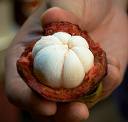Women make up a majority of Dr. Oz’s audience. The majority of women would like to lose weight. That is a match made in heaven, a marketer’s dream. And Oz has never hesitated to exploit that fact to increase audience share, playing fast and loose with sensationalized evidence instead of giving his viewers science-based advice.

Garcinia cambogia extract (GCE) comes from a tropical fruit from India and Southeast Asia. The active ingredient, hydroxycitric acid (HCA), is said to block fat and suppress the appetite.
Dr. Oz has promoted a series of weight loss supplements on his show. Raspberry ketones were presented as a fat-busting miracle, then green coffee bean extract was touted as “magic,” “staggering,” and “unprecedented.” And now both of those miracles have apparently been superseded by an even greater miracle: Garcinia cambogia extract.
Dr. Oz calls it “The newest, fastest fat buster.” A way to lose weight without “spending every waking moment exercising and dieting.” “Triples your weight loss.” “The most exciting breakthrough in natural weight loss to date.” “The Holy Grail.” Oz claims that “Revolutionary new research says it could be the magic ingredient that lets you lose weight without diet or exercise.”
All that sounds too good to be true, and it is. Garcinia probably does work to some extent to improve weight loss, but the evidence doesn’t begin to justify such grandiose claims.
Garcinia basics
Garcinia cambogia extract (GCE) comes from a tropical fruit grown in India and Southeast Asia. The active ingredient has been identified: hydroxycitric acid (HCA). It is said to block fat and suppress the appetite. It inhibits a key enzyme, citrate lyase, that the body needs to make fat from carbohydrates. It suppresses appetite by increasing serotonin levels; low serotonin levels are associated with depression and emotional or reactive eating.
It allegedly decreases belly fat, suppresses appetite, controls emotional eating, and changes body composition by increasing lean muscle mass. It doesn’t just produce weight loss, but it improves overall health. It is said to decrease cholesterol, LDL, and triglycerides by 10-30% and to raise levels of the “good cholesterol” HDL.
Quality concerns
An independent analysis found that some brands contain far less active ingredient than claimed. Consumers are advised to look for at least 50% GCE with potassium but with no fillers, binders, or artificial ingredients.
It should be taken on empty stomach 30-60 minutes before a meal. Results increase with dosage, but doses over 3 000 mg a day should be cleared with your doctor.
Oz’s advice
Dr. Oz recommends a dose of 500-1000 mg of Garcinia cambogia potassium before each meal. (Some experts believe the potassium salt is more effective than other formulations.) He says not to take it if you are pregnant or breastfeeding, or if you have Alzheimer’s disease or other forms of dementia, because it can worsen dementia. If you have diabetes, it can cause hypoglycemia, and if you are on a statin, it can increase the risk of harmful side effects like rhabdomyolysis or muscle degradation.
Oz contradicts himself: he suggests that it can produce weight loss without diet or exercise, yet he clearly recommends it be used along with exercise and properly portioned meals.
The garcinia evidence
With Dr. Oz’s track record, I was not willing to simply accept his word for the wonders of Garcinia. I went to PubMed, where a search for hydroxycitric acid brought up 64 articles. Some were irrelevant, and the relevant ones included a lot of animal studies and a smaller number of human studies with inconsistent results.
Guinea pigs on a high cholesterol diet who were given a different Garcinia species (atriviridis) had a tendency to decrease lipid composition levels and fat deposition in the aorta. HCA caused congenital defects in rats. Another rat study found that it decreased body weight gain and visceral fat accumulation by reducing food intake but had no lasting beneficial effects on hypertriglyceridemia and hyperinsulinemia. Yet another rat study showed that it suppressed body fat accumulation but was toxic to the testes.
To try to make sense of the inconsistent results, Onakpoya et al. did a systematic review of the published randomized controlled trials (RCTs) as of 2011. Their analysis found a small, statistically significant difference in weight loss (1.75 kg vs 0.88 kg, less than 2 pounds). They commented that the studies all had methodological weaknesses, so these results could be due to GIGO (garbage in/garbage out). The two studies with the best methodology found no statistically significant difference from placebo. Adverse events were twice as common with Garcinia (headache, nausea, upper respiratory and gastrointestinal symptoms). The authors concluded:
The evidence from RCTs suggests that Garcinia extracts/HCA generate weight loss on the short term. However, the magnitude of this effect is small, is no longer statistically significant when only rigorous RCTs are considered, and its clinical relevance seems questionable.
Oz featured a patient testimonial on the show from a woman who had lost 10 pounds in 4 months. She started noticing results after a week; she reported that her sugar cravings were decreased, she had more energy, and she went down a dress size from 10 to 8. She had no side effects. Says she was at a plateau and wanted a jump-start.
Garcinia verdict
At this point, I don’t think we can reliably say whether Garcinia has a clinically relevant advantage over simple calorie reduction and exercise. It appears to be safe, and it may have a role in helping patients lose weight by assisting motivation and enlisting placebo effects.
Dr. Oz’s popularity is enduring, but diet fads aren’t. I confidently expect another “miracle” to supplant Garcinia in the Land of Oz in the not-too-distant future.
